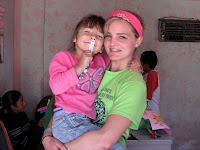"Free to be Me," by Francesca Battistelli is a song with lyrics that describe the theme of my life. The chorus sings, "I'm trying to fit the pieces together. But perfection is my enemy. On my own I'm so clumsy. But on Your shoulders I can see, I'm free to be me." It has taken some time, but I have discovered that in spite of all my clumsiness, I can stand on God's shoulders and feel free to be who I am as His girl
First Verse: At this point in my life as a high school senior "I'm still looking for a dream. A war is already waged for my destiny." The future and my dreams are uncertain. My mind is at war as God fights for my destiny, against my sinful desires. Yet, the following line of lyrics speak out, "But You've already won the battle and You've got great plans for me." God has already won the battle over my sin and has my life planned out for His purposes, which are beyond being explainable.
Second Verse: "When I was just a girl, I thought I had it figured out. My life would turn out right. . .," are the thoughts of the girl I used to be. I was convinced that if I had life figured out, obeyed God's Word perfectly, and performed excellently in everything I did, my life would become near perfect. Perfection of myself and my life were what I lived for. I have come to realize the words sung by Battistelli in the following lines of the second verse, “Things don't always come that easy.” The reality I needed to face with my "perfection" mentality was that God never promised that my life would be perfect. I am expected to pursue His holiness, in full knowledge that it is not for my life to be "better," but rather to serve God's purposes which are guaranteed to include trials. I am far from having life figured out, but praise God that He does.
 Chorus: Returning to the chorus of Francesca's song, "I've got a couple dents in my fender. Got a couple rips in my jeans. Trying to fit the pieces together. But perfection is my enemy," I find that I have many dents and rips. I am not perfect. The desire to be perfect is my enemy because I want perfection for self-satisfaction. In other words, I want to believe that I am worthy to be a child of God. In truth I am far from worthy to be His child. But, God came to save the least of mankind, the sinners, and the sick in heart. At the end of the chorus the words sing, "On my own I'm so clumsy, but on your shoulders I can see, I free to be me." Because He is working on changing me in spite of myself, I can stand on His shoulders and be free.
Chorus: Returning to the chorus of Francesca's song, "I've got a couple dents in my fender. Got a couple rips in my jeans. Trying to fit the pieces together. But perfection is my enemy," I find that I have many dents and rips. I am not perfect. The desire to be perfect is my enemy because I want perfection for self-satisfaction. In other words, I want to believe that I am worthy to be a child of God. In truth I am far from worthy to be His child. But, God came to save the least of mankind, the sinners, and the sick in heart. At the end of the chorus the words sing, "On my own I'm so clumsy, but on your shoulders I can see, I free to be me." Because He is working on changing me in spite of myself, I can stand on His shoulders and be free.Third Verse: The final verse of the song states, "Sometimes I believe that I can do anything. And other times I think, I've got nothing good to bring." In so many instances I have looked at myself with utter hopelessness, believing that I can no longer bring anything good into the world. Nevertheless, the next verse is where God steps into the picture, "But You look at my heart and You tell me that I've got all You seek, even though I've got a couple dents. . ." God uses sinners. I am a sinner that is being used by a perfect God. I have discovered that in spite of my clumsiness, my sin, I can now stand on the fact that I am His and can be who I am in Christ. I am free to be me.
Free To Be Me Youtube Video Link:
http://www.youtube.com/watch?feature=player_detailpage&v=38LcrMZutJs
Free To Be Me Youtube Video Link:
http://www.youtube.com/watch?feature=player_detailpage&v=38LcrMZutJs








